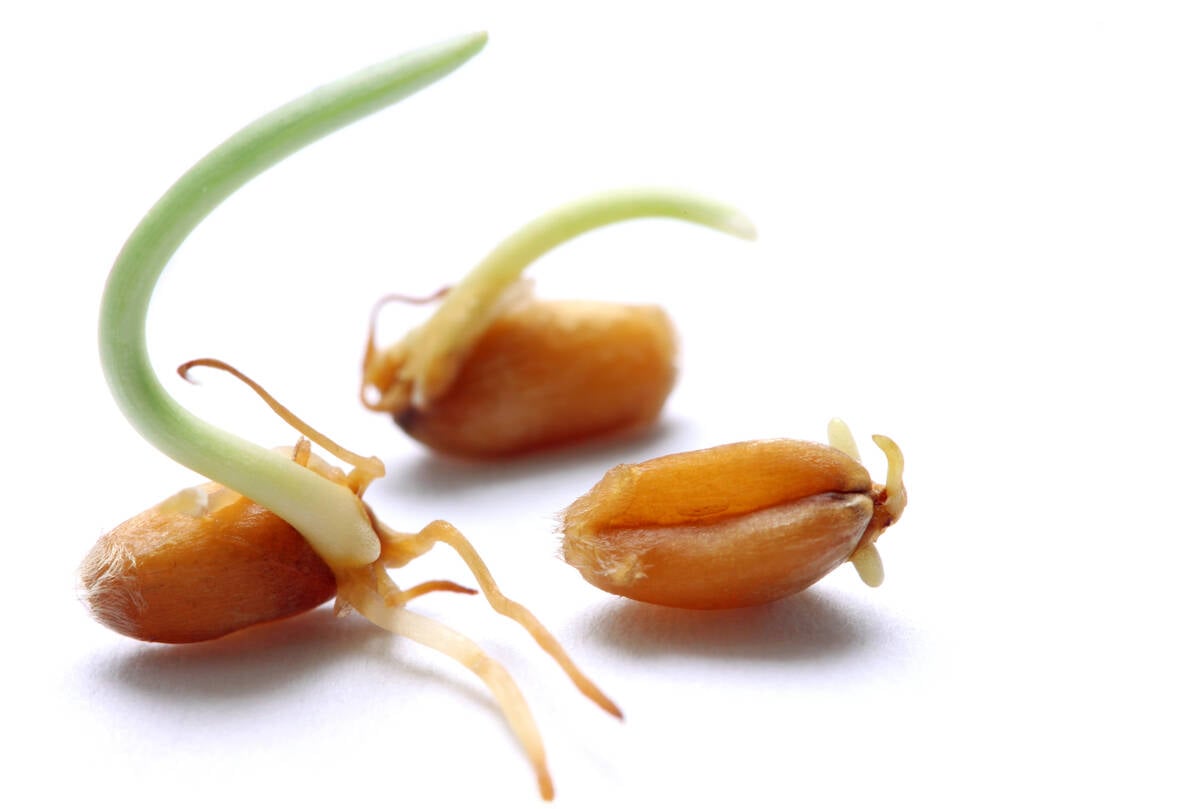Why is the prairie grain industry dominated by century-old family-owned grain companies?
“It’s a good question, isn’t it,” said Bill Parrish, whose family has coowned the Parrish and Heimbecker grain company for 102 years.
“I don’t know. You don’t really see it in other industries.”
But with the grain marketing situation in Canada changing radically with the demise of the Canadian Wheat Board monopoly, some wonder whether foreign grain companies will swoop into the Prairies and gobble up Canadian companies.
Read Also

Manitoba farmers fight sprouted wheat after rain
Rain in mid-September has led to wheat sprouting problems in some Manitoba farm fields.
A foreign company looking to buy its way into Canada in a big way would either have to buy publicly traded Viterra or one of the family owned and operated firms: Paterson GlobalFoods, Parrish and Heimbecker or Richardson International.
None of them has shown obvious signs of wanting to get out of the business. Parrish said it’s not in his company’s strategic plan.
“We always keep all our options open, but we’re generally not interested,” said Parrish. “It doesn’t seem to make much sense for us.”
Andrew Paterson, owner of Paterson GlobalFoods, said his company began in 1908 and is not for sale.
“It’s going to continue being a Canadian family business.
“As far as foreign companies are concerned, that’s fine, tell them to come in and build their own assets and we’ll compete head to head. I have no concerns.”
Family owned companies are different corporate beasts than publicly traded companies and co-operatives. The latter two usually have complex management systems and large bureaucratic and regulatory commitments to defined governance models.
Paul MacDonald, executive director of the Canadian Association of Family Enterprise, said family companies have advantages that allow them to do better and last longer than other types of companies. However, there are also disadvantages.
“If the tools aren’t in place, they can implode,” said MacDonald, whose organization helps families running companies to organize succession planning, strategic planning and intra-family communication.
MacDonald said the widespread belief that family businesses don’t survive multiple generations isn’t true of many big family companies.
However, companies can disintegrate if the family vision isn’t passed down to succeeding generations.
“I think (success) comes from instilling the family values, instilling the family vision, instilling the family priorities and plan in the kids from an early age,” said MacDonald.
“It’s, ‘you’re in the family and you’ve got to continue the family tradition.’ ”
The Richardson family has an annual gathering of its scattered members, at which they tackle vision reinforcing and strategic planning.
Many family-dominated companies in the grain business, whether Canadian or foreign such as Cargill and Louis Dreyfus, have had senior managers and officers from multiple generations of the family.
MacDonald said having the family name on a business often motivates owners to take it more seriously.
“There’s a sense of passion, of passion for the family business,” said MacDonald.
From that comes personal sacrifice and a drive to succeed.
All three of the Winnipeg-based grain companies contain their owners’ family names, as is true of other well-known agricultural companies, such as Simplot and McCain.
MacDonald said family-run businesses are able to make fast decisions and act boldly. As well, they don’t have to keep shareholders happy on a quarter-to-quarter basis, which allows them to focus on the long-range vision.
How these factors play into the post-CWB world remains to be seen.
Parrish said foreign companies have started operating on the Prairies before and then left after a few years, as with ConAgra, or remained modest in size, such as Louis Dreyfus. Both companies entered with large elevator building projects.
Parrish thinks this time foreign companies might prefer to use existing grain elevator networks rather than build from scratch.
“You always have the risk of overcapacity, so probably it would make sense for them to either buy someone or try to get some kind of alliance,” he said.
When Bunge’s world and North American chief executive officers were in Winnipeg this fall, they showed interest in moving into Canada’s cereal grains business after the CWB’s control disappears.
However, they also said Bunge doesn’t need to buy a company to be active. They often form partnerships with existing grain companies to serve their needs.
Parrish didn’t know why the grain industry seems to be dominated by family companies. Perhaps it is the relatively low-tech nature of the industry, which doesn’t force radical changes every few years.
However, his family has been happy to keep with it generation after generation.
“I guess it’s not a fad business,” said Parrish with a laugh.
FAMILY OWNED GRAIN COMPANIES
Parrish and Heimbecker
•About 40 grain delivery points and farm supply centres as well as full or partial ownership of port terminals in Vancouver, Great Lakes and Halifax
•New Life Mills Ltd, feed manufacturing division
•P&H Foods, Butterball meat products in Canada
•P&H Milling Group includes Dover Industries’ five flour mills, Ellison Milling In Lethbridge, Parrheim Foods in Saskatoon
Paterson GlobalFoods
•About 37 grain delivery points and farm supply centres and part owner with P&H and others of Alliance Grain Terminal in Vancouver
•Organic businesses include FeedMax, Canada’s largest livestock feed maker at Killarney, Man., Nutrasun Foods flour mill in Regina and Growers International Organic Sales Inc., the largest exporter of Canadian organic commodities
•Global Grain Australia and Global Grain Asia Brokerage
•Alliance Seed Corp.: a partnership of Paterson and five grain companies
•Trucking and construction operations
Richardson International
•Richardson Pioneer is Canada’s second largest grain handling network with affiliated crop input retail operations and seed sales at about 65 locations. Port operations in Vancouver, Prince Rupert, Thunder Bay, Hamilton and St. Lawrence
•Richardson Oilseeds is Canada’s largest fully integrated crushing, refining, processing and packaging operation with plants at Yorkton, Sask., and Lethbridge
•Richardson Nutrition markets food and ingredients made from canola. Canola Harvest is its retail brand
•Non-agricultural businesses include oil and gas production, financial services, property management [















